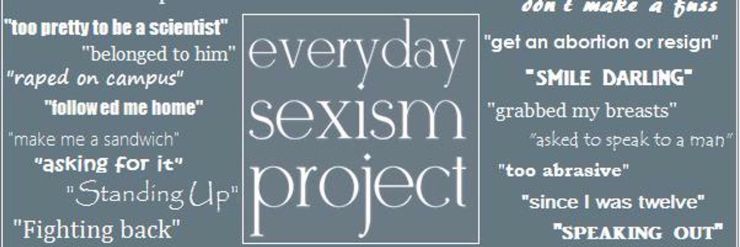TORONTO — After being groped on public transit and sexually harassed on the street, Laura Bates decided to start a project three years ago today called Everyday Sexism.

Since then, she has used it to help make public transport safer for women in London. She’s worked with politicians in the UK, Denmark and representatives from the Council of Europe to help shape policy; and talked to youth about issues like consent and healthy relationships.
The project has also influenced Facebook’s policy on rape and domestic violence content and gotten Apple to remove a “plastic surgery for ‘Barbie’ app.”
But its beginnings were humble. Bates’ wish for her small site was for it to be a window into women’s lives and what they were putting up with on a daily basis. Her hope was to get 100 women to submit their stories.
The stories that Bates received, she said, have ranged from street harassment and workplace discrimination to young women experiencing assaults on university campuses, and accounts of rape.
What has stood out most for her, though, is the sheer number of entries that have come in from young girls.

Get breaking National news
“When you start to look at the entries from girls who are only 11 or 12 you start to realize how big of a problem it is.”
“They’re in their school uniform when they start to be shouted at by men in the street… having men touching them on public transport.”
WATCH: Woman gets harassed over 100 times walking on NYC streets in viral video
The problem, Bates believes, is how normalized sexism appears to have become in our society. She said that “acceptability” can make it hard for a woman to stand up for herself without seeming uptight. That’s where she thinks her work has made a difference.
READ MORE: Kristi Gordon’s haters reflect bigger problem faced by women in media
“It’s not just a case of sharing your story on a website.”
“We hear thousands of stories from women who say — because of seeing all those other stories — it’s given them strength for the first time to report an assault to the police, to report discrimination to an HR department… and to take action that they didn’t feel able to before.”
Here are some of the messages that have been sent in to Everyday Sexism. You can find more on Twitter and Facebook.
From a 14-year-old girl:
In my science subjects (Chemistry and Physics), I am constantly told I can’t be good at things because I’m a girl. That I need to get back in the kitchen. That all I’m good for is cleaning, cooking, and blowjobs. I am sick of being told my opinion isn’t worth anything and having the response ‘just ignore it.’
READ MORE: Female astronaut asked about hair, makeup plans in space
From a secondary science teacher and tutor:
I witness on a daily basis the girls in my classes being called ‘whore’ ‘bitch’ ‘slag’ ‘slut’ as a matter of course, heckled if they dare to speak in class, their shirts being forcibly undone and their skirts being lifted and held by groups of boys…
On a daily basis I am forced to confiscate mobile phones as boys are watching hardcore pornography videos in lessons and I have noticed sadly that as time has gone on the girls in my classes have become more and more reserved and reluctant to draw attention to themselves.
READ MORE: Wildrose’s Rick Strankman apologizes for ‘Bring your wife’s pie’ poster
From students:
– After being continuously groped against my will by one boy in my class for the majority of the year, finally had enough and told a teacher, only for them to tell me that ‘boys will be boys.’
– Today I blew my nose in a geography lesson. The male teacher looked up from his marking and announced to the class, “Well, that wasn’t very ladylike, was it?”
– My (female) teacher declared that ‘boys just cant help themselves’ in a lesson about sexual bullying. Other conversations about girls as ‘teases’ in revealing clothing also happened.
– My eight-year-old cousin came home from school in tears because when she told the teacher she wanted to be an engineer, he told her to ‘pick a more reasonable job for a woman.’





Comments